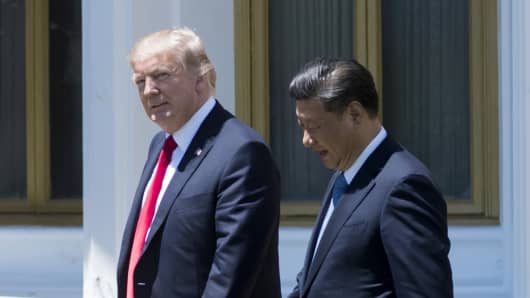The escalating saber rattling between the U.S. and North Korea has raised the prospects of an economic confrontation between America and China.
At issue are a series of sanctions against Pyongyang designed to convince North Korean leader Kim Jong Un to curb his ambitions to develop a nuclear missile capable of striking the U.S. mainland.
But those measures have had little impact on the increasingly bellicose stand-off, and on Thursday President Donald Trump repeated his complaint that Beijing needs to lean harder on Pyongyang to defuse rising tensions.
"I think they can do a lot more and I think they will do a lot more," the president told reporters. "We lost hundreds of billions of dollars a year on trade with China. They know how I feel. It's not going to continue like that."
On Tuesday, Trump threatened to inflict "fire and fury" on North Korea if it continues to pursue its nuclear weapons program. A recent series of successful North Korean test launches were matched Wednesday by Kim's threats to launch a missile at the U.S. territory of Guam.
The latest round of sanctions includes fresh restrictions, unanimously approved Saturday by the United Nation Security Council, that target North Korean exports of coal, iron, iron ore, lead, lead ore and seafood. The measures also ban countries from hiring more North Korean laborers, bar new joint ventures with North Korea and ban fresh investment in existing joint ventures.
"We say to China, 'You have a choice whether you do business with North Korea or you do business with the U.S. but you can't do both.'"
Economic sanctions so far have proved ineffective largely because North Korea has found ways to get around them with "evasion techniques that are increasing in scale, scope and sophistication," according to a February U.N. report.
"Designated entities and banks have continued to operate in the sanctioned environment by using agents who are highly experienced and well trained in moving money, people and goods, including arms and related material, across borders," the U.N. report found.
The widest flow of goods and cash, by far, crosses North Korea's border with China. As North Korea's largest trading partner, China accounted for roughly 85 percent of overall volume in 2015, according to data from the United Nations Comtrade database.
Coal and other minerals accounted for more than 40 percent of North Korean exports in 2015, followed by textiles (29 percent), metals (7 percent) and machinery (6 percent). North Korea's biggest imports included textiles, machinery and raw materials including minerals, metals and plastics.
Though China has taken some steps to curb imports from North Korea, exports rose by nearly 30 percent in the first half of this year, according to Chinese customs data. During the six-month period, overall trade flows across the North Korean-China border rose 10 percent to $2.65 billion.
That's why critics of the existing North Korean sanctions say the measures don't go nearly far enough in cutting off the flow of cash and goods to the Pyongyang regime.
Some of those critics are calling for "secondary sanctions," which would cut off trade and financial flows to any country doing business with North Korea.
"We say to China, 'You have a choice whether you do business with North Korea or you do business with the U.S., but you can't do both,'" Sen. Chris Van Hollen, D.-Md., told MSNBC on Thursday. "That is what got people's attention with the Iran sanctions, and that's what we need to do now."
Last month, Van Hollen co-sponsored a bill with Sen. Pat Toomey, R.-Pa., that would impose secondary sanctions targeting third parties and countries that do business with North Korean companies and individuals.
Secondary sanctions offer a powerful financial weapon by allowing the U.S. government to bar foreign banks access to the U.S. financial system.
In late June, the White House imposed limited secondary sanctions on two Chinese citizens and a shipping company for helping North Korea develop nuclear weapons and also accused a regional Chinese bank, the Bank of Dandong, of laundering money for Pyongyang, Reuters reported.
Beyond cutting off cash and supplies to the North Korean regime, secondary sanctions squeeze the flow of cash to individuals, putting pressure on Kim's political allies, according to David Cohen, a senior CIA official in the Obama administration.
"Imposing secondary sanctions would send a strong message to North Korean leader Kim Jong Un that the financial noose is tightening in a way that could drive a wedge between Kim and the Pyongyang elite critical to his continued hold on power," Cohen wrote in a recent op-ed piece.
Imposing secondary sanctions that single out major Chinese banks and state enterprises comes with the risk of economic retaliation from Beijing.
To minimize that risk, the White House will need to build a much wider coalition of Asian countries, says Nicholas Burns, former U.S. ambassador to NATO during the George W. Bush administration.
But developing that coalition will be a tough task for an administration that has yet to fill dozens of key diplomatic positions. So far, the White House has filled fewer than half of the State Department positions that require Senate confirmation.
"It really is a time for diplomacy," Burns told CNBC on Thursday. "But there's no American ambassador to South Korea, there's no secretary of State for East Asia. So, you've also got to fill out the ranks."



